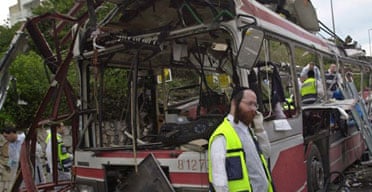A suicide bomber blew himself up on a crowded bus in the northern Israeli city of Haifa today, killing at least 15 people and injuring dozens, officials said.
Police said the suicide bomber detonated explosives that were strapped to his body.
The bus driver, Marwan Damouni, told Israeli army radio that the bus exploded as he stopped at a station and opened the doors to let passengers off.
"I suddenly heard an explosion," said Mr Damouni, who was being treated at Carmel hospital. "I tried to move, to see if there were wounded ... I couldn't hear anything because of the force of the blast."
At least 10 people died at the scene and the others died at the hospital, police and rescue officials said. Dozens were seriously injured.
The explosion, the first terrorist attack in Israel since January, ripped the roof off the No 37 bus, strewing wreckage and body parts across the street.
It happened at about 2.17pm local time (12.17 GMT), shattering the afternoon calm in a prosperous neighbourhood on Mount Carmel. Moriah Street, where the blast occurred, is the main thoroughfare connecting a hotel promenade that overlooks the large bay and port with the university district just south of the city. Officials said that, at that time, the bus would have been packed with students from the nearby University of Haifa.
There was no immediate claim of responsibility for the blast, which comes as Israel's new hardline government continues its clampdown on Hamas militants in Gaza and the Palestinian Authority considers far-reaching political reforms.
Police said the bomb was "medium-sized", laden with metal shrapnel and strapped to the bomber's body.
Israeli media earlier reported that the blast was caused by up to 60kg of explosives - an exceptionally powerful bomb compared to those used in past attacks. The explosion's force caused damage and debris to cars as far as 30 metres away.
The US president, George Bush, condemned the attack, saying that terrorists will not prevail in the region.
"Once again, the bestial hand of Palestinian terrorism has struck at the heart of Israel," said Mark Sofer, an Israeli foreign ministry spokesman. He said that in the past two months, Israeli forces have thwarted almost 100 attempted terrorist attacks.
Saeb Erekat, a Palestinian cabinet minister, condemned "any attack that is targeting civilians, whether Palestinian or Israeli". He added: "We reject the Israel government finger-pointing - that the Palestinian Authority is responsible."
In the past Israel has reacted with tough military measures after such attacks and has blamed Yasser Arafat, saying the Palestinian Authority does nothing to prevent terrorism.
However, Israel may be constrained in any reaction by the possibility of an imminent US strike against Saddam Hussein, because the US has made clear that it wants to avoid exacerbating the Israeli-Palestinian conflict until the Iraq issue is resolved.
Ovadia Saar, who was driving another bus just behind the one that was attacked, said he saw "the back of the bus fly into the air, and the windows blew out and a great cloud of dust covered the bus".
"I got out and ran toward the bus. It was a horrible sight. There were a few bodies in the street," he said. "Those we saw breathing we evacuated."
The blast toppled some palm trees and left the bus a skeleton of charred and twisted metal. Cars that were parked nearby were also damaged, and some passers-by were among the injured.
Israeli police went on alert throughout the country amid warnings that more attacks were planned, reports said.
The blast is the first terror attack in Israel since January 5, when two suicide bombers killed 23 people in Tel Aviv.
Abdel Aziz Rantisi, a spokesman for the Islamic militant group Hamas, praised the attack but did not claim responsibility. "We will not stop our resistance," he said. "We are not going to give up in the face of the daily killing [of Palestinians]."
The attack comes days after the establishment of a new rightwing government in Israel. Mr Arafat, the Palestinian leader, is currently considering appointing a Palestinian prime minister - a move demanded by the US and Israel as a means of sidelining the ageing leader.
